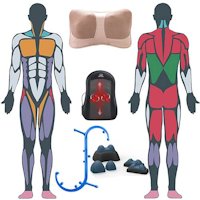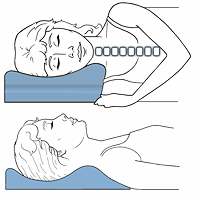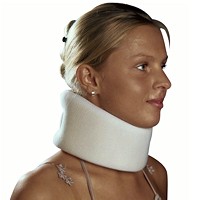Cervical Strain Is A Common General Diagnosis That Can Be Related To Different Factors
A common diagnosis for mechanical neck pain is cervical strain, which is attributed to injury to the soft tissues of the neck. These soft tissues are muscles, tendons and ligaments. This type of injury can result from a motor vehicle collision and is termed whiplash and the collection of symptoms called whiplash associated disorders.
It may be that muscle or ligament injury causes blood vessels to tear and form areas of blood accumulation or hematomas within the muscle tissue. This may irritate the muscles and cause pain and spasm. The hematomas may cause scar tissue to form or a fibrosis response, which can alter the muscle structure and cause changes in the soft tissues resulting in continued pain and spasm. Changes in muscles have been seen on MRI scans in patients with chronic mechanical neck pain.
 There are indications that injury to the joints behind the body of the spinal bones are related to the pain of whiplash and cervical strain. This is often called facet joint syndrome. It is also possible that the capsule surrounding the joint gets stretched or torn and causes pain. Studies have shown that stimulation of the joints produces mechanical type neck pain.
There are indications that injury to the joints behind the body of the spinal bones are related to the pain of whiplash and cervical strain. This is often called facet joint syndrome. It is also possible that the capsule surrounding the joint gets stretched or torn and causes pain. Studies have shown that stimulation of the joints produces mechanical type neck pain.
Another cause of pain related to is the disc. While typical findings of disc herniation are absent, small tears in the outer part of the disc called the annulus may cause an unstable area and place pressure on the joints resulting in pain. The disc itself is pain sensitive and analgesic injections into the disc have resulted in temporary relief of mechanical neck pain symptoms.
The exact cause is often not clear and is frequently used as a general initial diagnosis (sprain/strain). Clear features on examination and radiographs are generally not found. It is not understood why some people improve within a short period of time, while other do not and suffer chronic neck pain. The most likely explanation is that cervical strain has many factors involved, including social and psychological influences in addition to the biomechanical and biochemical effects of injury.
Most often there are findings of tenderness along the muscles and reduced motion without any neurological problems. Certain areas of muscle soreness called trigger points can be very sensitive to pressure.
Technically, strain refers to injury or tear of a muscle, while sprain refers to a ligament. It may be either or both, however, this is a diagnosis until more workup can be done, including response to treatment and additional radiological or diagnostic procedures to formulate a better working diagnosis after any fracture or disease has been ruled out.
 Muscle Therapy Tools Muscle Therapy Tools |
 Cervical Pillows Cervical Pillows |
 Neck Support Collars Neck Support Collars |
According to a 2019 study in the Journal of Athletic Training cervical muscle strains may not be perceived as severe, but they can have negative impacts of quality of life result in high treatment costs. They may place individuals at risk for further and can affect the muscle’s ability to function at both at rest and during contractions.
The next part focuses on cervical degenerative disc disease which is a possible result of cervical strain that persists and results in progressive neck pain.
Mechanical Neck Pain | Features Neck Pain | Radiographs Neck Pain | Cervical Degenerative Disc Disease |
C4 Radiculopathy | Failed Neck Surgery | Rheumatoid Neck Disorders | Shoulder Problems | Summary
